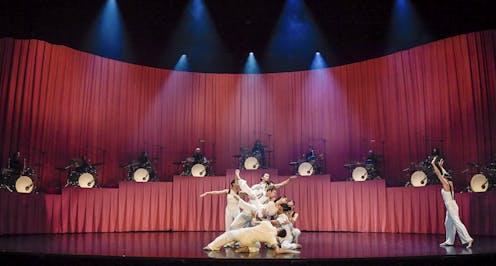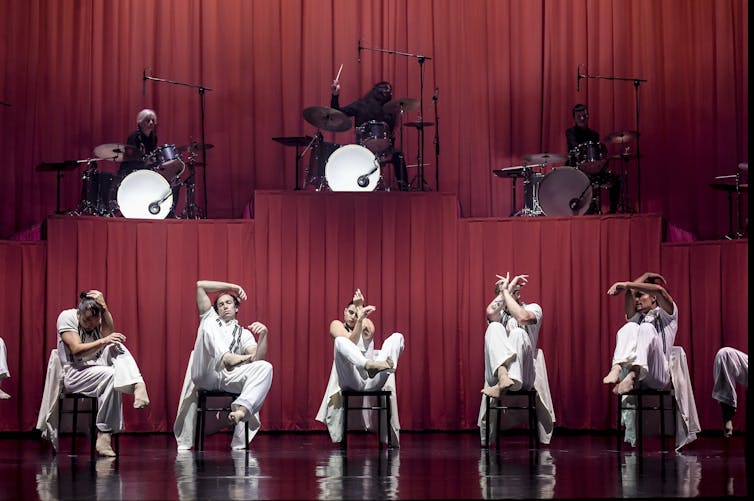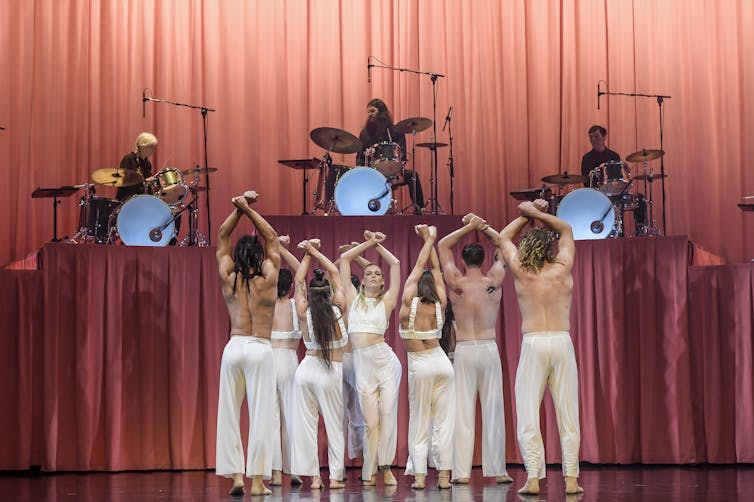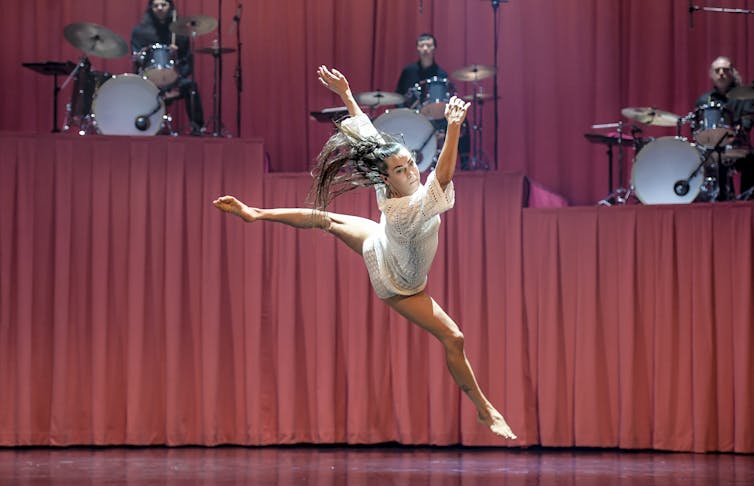Source: The Conversation (Au and NZ) – By William Peterson, Adjunct Associate Professor, Auckland University of Technology

Roy Vandervegt/Adelaide Festival
Review: Manifesto, choreographed by Stephanie Lake, Adelaide Festival
Nine drummers, nine dancers, what’s not to love? So ran my imaginary opening line for this review.
But Manifesto, choreographed by Melbourne-based Stephanie Lake is much more complex and satisfying than the mere pairing of dancers with drummers might suggest.
As the show opens, drummers are seated and equipped with a standard drum kit: bass, snare and tom drums and cymbals.
Charles Davis’s classy set is reminiscent of a 1930s Busby Berkeley movie. Drummers occupy raised positions along the back of the stage. Lush, red hanging curtains fill the visual field, with a niche for each drummer.
The work starts with simple beats. Beats don’t necessarily create rhythm. Beats can simply be sounds that seem to come from nowhere and suddenly stop, as they do early in the work.
On the silent beat, dancers freeze in a dramatic tableau, enhanced by Bosco Shaw’s beautifully focused lighting. Single beats turn into a succession. Dancers seem to magically appear from nowhere. Freezing, they create unexpected focal points.

Roy Vandervegt/Adelaide Festival
Gesture and composition direct the eye, often to an individual dancer. But just when you think a pattern is being established, a new sequence of beats and images sears into the retina.
Sounds become increasingly complex, with drum rolls, shallow beats and rolling trills on the snare drum. The clang of the cymbals suggests a storm moving in. Later, drummers make seemingly impossible sounds reminiscent of industrial noise.
Continuously morphing
Like the choreography of Twyla Tharp, the movements of Lake’s dancers are often recognisable from daily life, though enhanced and embellished. Each successive movement is utterly unpredictable, executed in a delightfully relaxed and fluid manner, with seemingly effortless falls, leaps and catches.
Movement is at times silly, as in a butt wiggle that makes the kids in the audience squeal with delight, but also sexy, with hips and asses drawing attention to the beauty of human form in motion.
When the dancers come together, we don’t see formations being set up as they’re unfolding so fluidly and rapidly. Everything shifts constantly, continuously morphing: a series of collective shapes and forms that can’t be predicted.

Roy Vandervegt/Adelaide Festival
Beats turn into longer rhythmic sequences as bodies are held aloft, on the floor, flying across and off the stage, constantly shifting. Moments of high drama increasingly come fast and furiously.
At times dancers appear to be fighting to regain control of bodies, as if the body has a mind of its own.
As the drumming builds and the energy heats up, the men doff their shirts. It’s as if a series of perpetual motion machines have been activated.
In another sequence, choreography focuses on the hands and arms manipulating the body in uncomfortable and disturbing ways. It is reminiscent of the choreography of Pina Bausch, but unlike Bausch’s work, Lake’s dancers are not being acted upon by others, but touch their own body as if it is not their own.
Anything can happen
As dancers roll, fly, and bounce off the floors individually and in pairs and small groups, it is clear how Lake’s choreography highlights the individual strengths of her cast. Similarly, composer Robin Fox has successfully marshalled a clearly differentiated set of drummers with diverse skill sets and sounds.
Racing toward the final coda, dancing becomes increasingly hyperkinetic. With jumping kicks, the work takes on an almost gladiatorial, confrontational quality.
Just as quickly, the movement switches into a kind of whirling dervish mode, enhanced by the swaying light fabric of Paula Levis’ costumes. These costumes drape, move, flow, and enhance movement, drawing attention to the diverse body styles of the dancers and turning dancers into characters we can track.

Roy Vandervegt/Adelaide Festival
In the work’s penultimate moment, a heart beat brings all the dancers together, then apart, then together.
A rhythmic sequence is introduced and repeated, a kind of military tattoo the audience can discern and unconsciously anticipate. The dancing takes on an increasingly ecstatic quality and we’re with them on the beat.
There is a purposeful contrast between the precision and repetition of the martial, parade-like beat, and the free and playful – even sexy – spirit of the dancers, increasingly moving into a state of wild abandon.
Dancers move down to the lip of stage as total mayhem results. One streaks naked across the stage. The work ends at an absolute fever pitch. When I saw it, the audience leapt to their feet, compelled to rise and shout.
Manifesto is a beautifully and carefully crafted work, one that continually keeps the audience in a state of not knowing what will happen next.
Anything can happen in this tightly crafted, remarkably innovative and thrilling work. And it does.
Adelaide season closed. Manifesto will play at Rising: Melbourne in June.
![]()
William Peterson does not work for, consult, own shares in or receive funding from any company or organisation that would benefit from this article, and has disclosed no relevant affiliations beyond their academic appointment.
– ref. ‘Innovative and thrilling’: Stephanie Lake’s Manifesto is a joy – https://theconversation.com/innovative-and-thrilling-stephanie-lakes-manifesto-is-a-joy-175332




